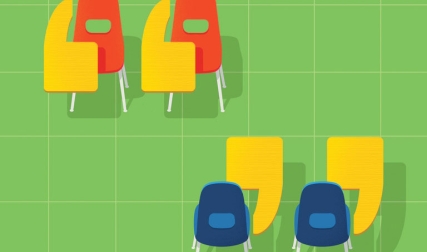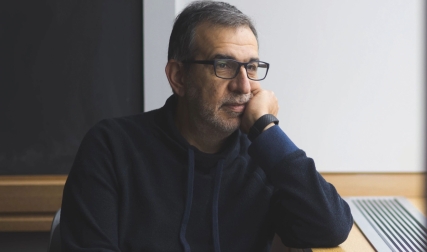"Video games burst with social significance,” reads the syllabus for Video Games and the Meaning of Life, an interdisciplinary course created and taught by music department chair William Cheng. He wants to explore what video games might teach us, he says, “about all dimensions of humanity and daily life, about technology, violence, beauty, interactivity, media, and more.” Cheng, 38, organizes students into play pods that do just that, and they create and take quizzes in a Jeopardy! format. But the course also includes extensive readings and discussions that delve into what he calls the “modern human condition.”
Why video games?
Games have always been core to who I am. Games not only allowed me to connect as a kid with my dad as I grew up in Taipei, games saved my life in lots of ways: when I was struggling to figure out who I am, coming out, becoming a scholar, and navigating my life as an immigrant and first-generation kid. They showed me possible worlds. Playing The Sims, a game in which characters just walk around and do chores and interact with other characters controlled by AI, I could build models of families, including same-sex ones, that I never thought I might be able to experience in real life.
What did you play with your father?
Everything from Mario Bros. to games where my dad and I each controlled a tank and shot other tanks. It’s not so much the games—it’s the memories of spending time just lazing away the afternoons with my dad and feeling like nothing else really mattered. Time and worries fall away.
And you kept playing as you got older?
I really enjoyed playing Super Smash Bros. with friends in college. That allowed me to tap into aspects of sociality and camaraderie that I, as an awkward kid at first, didn't necessarily feel equipped to achieve in other ways.
What do you think about games that feature extreme violence?
I could talk for a long time about the rightful societal critiques of games, the sexism and misogyny and homophobia. Franchises such as Grand Theft Auto, for example, are infamous and get played up by the media. It’s easy to focus on the most violent games and forget that there are other kinds. Many gamers play a wide range of games. What’s heartening is that there is an equally forceful initiative within the industry to make games that do not even allow for violence or that might allow for violence but give you the tacit option of pacifism or nonviolence—and then allow the player to figure out what to do and reckon with the consequences.
How did the pandemic affect the video game market?
People wanted a way to visit their neighbors virtually and didn’t necessarily want to kill their neighbors in a shooter game, so other games became prominent. One of the biggest games during Covid, Animal Crossing, is very peaceful. You tend to nature and build a house and visit your neighbors and bring them gifts. There’s no fighting, there’s no conflict.
What’s an unusual game you cover in class?
During the week that we discuss death and mortality, we talk about a game called That Dragon, Cancer. It’s a series of vignettes that represent a couple’s newborn son, who has cancer. It’s meant to make you think about metaphors, about what it means to think about cancer as a big scary dragon, about what it means to have such a young, vulnerable protagonist. It’s really moving and unconventional. There’s a pivotal scene where Joel, the baby, is running along, and then this dragon, representing cancer, swoops in. You fight the dragon, but you can’t win that battle.
What are some of your required readings?
To scaffold students’ experience of that week, they read Susan Sontag’s Illness As Metaphor. They read Barbara Ehrenreich’s Bright-sided: How Positive Thinking Is Undermining America, in which she writes about her cancer diagnosis and how everyone tells her to be optimistic and win the battle. It’s a moving, sad, and difficult week.
You also teach that some game playing is the opposite of fun.
It’s been documented that in Chinese jails some prisoners are put in front of computers instead of mopping the floor. They play, for example, World of Warcraft and are tasked with gold farming and meeting a quota, which can be sold for real currency on third-party sites. The way these prisoners describe it, it is obviously not fun.
How did you create this course?
I started developing it after receiving tenure and feeling I had some space and time to innovate in my teaching. I wanted to deliver a classroom experience that feels rather different from other courses at Dartmouth.
How has your syllabus evolved?
It changes with each iteration, and I’ve taught it four times. One essay choice allows students to devise an extra week for the course. What topic could have been covered? Many students wrote that they were interested in the neurological and psychological effects of video games. I love learning from them.
What majors take this course?
All disciplinary backgrounds. We have from 100 to 200 students, and there’s a great multidisciplinary energy in the room, no major that is dominant.
Do you ever play games with undergrads?
I came back to campus at 11 p.m. once because a student in the Super Smash Bros. club invited me to a tournament in the Collis basement. I played a couple of rounds with them, and it was a lot of fun. They do things really late at night.
What are three video games you recommend right now?
1. Journey (2012)—It’s about the beauty of wandering and the enough-ness of just being.
2. Undertale (2015)—One of the most provocative,humorous, and musical gamesof the last decade. It should be required in high school literature classes, assigned alongside Orwell and Morrison.
3.What Remains of Edith Finch (2017)—A multimodal meditation on what we leave behind when we die.
What about three readings from your class?
1. “‘We Put Our Hands on the Trigger with Him’: Guilt and Perpetration in Spec Ops: The Line,” by Tobi Smethurst (2017)
2. “Over the Precipice: An Essay on Journey,” by Rob Parker (2012)
3. “Afterword: Toadofsky’s Music Lessons,” by William Cheng (2016)




